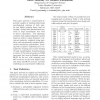Free Online Productivity Tools
i2Speak
i2Symbol
i2OCR
iTex2Img
iWeb2Print
iWeb2Shot
i2Type
iPdf2Split
iPdf2Merge
i2Bopomofo
i2Arabic
i2Style
i2Image
i2PDF
iLatex2Rtf
Sci2ools
108
click to vote
ACL
2000
2000
Minimally Supervised Morphological Analysis by Multimodal Alignment
This paper presents a corpus-based algorithm capable of inducing inflectional morphological analyses of both regular and highly irregular forms (such as broughtbring) from distributional patterns in large monolingual text with no direct supervision. The algorithm combines four original alignment models based on relative corpus frequency, contextual similarity, weighted string similarity and incrementally retrained inflectional transduction probabilities. Starting with no paired <inflection,root> examples for training and no prior seeding of legal morphological transformations, accuracy of the induced analyses of 3888 past-tense test cases in English exceeds 99.2% for the set, with currently over 80% accuracy on the most highly irregular forms and 99.7% accuracy on forms exhibiting non-concatenative suffixation. 1 Task Definition This paper presents an original and successful algorithm for the nearly unsupervised induction of inflectional morphological analyzers, with a focus on ...
ACL 2000 | ACL 2007 | Inflectional Morphological Analyses | Inflectional Morphological Analyzers | Irregular Forms |
Related Content
| Added | 01 Nov 2010 |
| Updated | 01 Nov 2010 |
| Type | Conference |
| Year | 2000 |
| Where | ACL |
| Authors | David Yarowsky, Richard Wicentowski |
Comments (0)

